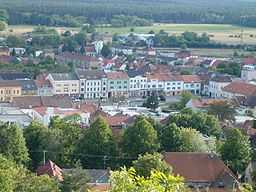Bzenec
| Bzenec | |||
| Town | |||
 | |||
|
|||
| Country | Czech Republic | ||
|---|---|---|---|
| Region | South Moravian | ||
| District | Hodonín | ||
| Commune | Kyjov | ||
| Municipality | Bzenec | ||
| Elevation | 183 m (600 ft) | ||
| Coordinates | 48°58′24″N 17°15′56″E / 48.97333°N 17.26556°E | ||
| Area | 40.34 km2 (15.58 sq mi) | ||
| Population | 4,316 (1.1.2012) | ||
| Density | 107 / km2 (277 / sq mi) | ||
| First mentioned | 1231 | ||
| Mayor | Pavel Čejka | ||
| Timezone | CET (UTC+1) | ||
| - summer (DST) | CEST (UTC+2) | ||
| Postal code | 696 81 | ||
  Location in the Czech Republic
| |||
| Wikimedia Commons: Bzenec | |||
| Statistics: statnisprava.cz | |||
| Website: www.bzenec.cz | |||
Bzenec (Czech pronunciation: [ˈbzɛnɛts]; German: Bisenz) is a town in the southeast of Moravia, in the Czech Republic. It lies in the South Moravian Region. The population is 4,305 (2005). Bzenec was first mentioned in 1015 (unofficial). In 1330 it became a town.
Districts
- See also Mikroregion Bzenecko[1]
- Bzenec
- Domanín (German: Domanin)[2]
- Moravský Písek (German: Pisek, Pissek)
- Syrovín (German: Sirowin)
- Těmice (German: Temnitz)[3]
- Vracov (German: Wratzow)[4]
- Žeravice (German: Zerawitz, Žerawitz, Scherawitz)
History
Jewish history

About the earliest history of its Jews nothing is known. Pesina, whose "Mars Moravicus" was published in 1677, calls it "nidus Judæorum".
In the time of the margraves (up to the 15th century) the Bisenz Jews must have enjoyed great privileges; for, according to the oldest "mountain-laws", they were permitted to own vineyards, it being a matter of great importance to the margraves to market their wine through the agency of Jewish traders. In the wars between George Podiebrad of Bohemia and Matthias of Hungary (c. 1458), Bisenz, and with it the Jewish quarter, was entirely devastated and came under constantly changing feudal proprietors.
According to the feudal "Urbarium" of 1604, the Jews even then possessed 32 houses, a hospital, and 17 smaller buildings, called "Hoferi Židovští." But only a year later (May 2, 1605) the Jewish community was totally destroyed by Stephen Bocskai; so that in 1655, when the new edition of the land-register was made out, 25 Jewish holdings still lay in ruins.
In the first Silesian war (Feb., 1742) the Jewish community suffered severely from the Prussian invasion, especially as its inhabitants had to bear their share of the general levies. At the close of this war the empress Maria Theresa in 1753 issued the so-called "Familien-Verordnung" (Family Ordinance), according to which only 5,442 Jewish families were allowed to live in Moravia; and of these 137 were allotted to Bisenz. On May 17, 1777, almost theentire Jewish ghetto, in which there were 93 houses, was burned. Up to 1782 the Jewish community was subject to the feudal lord; but in criminal matters they were under the jurisdiction of the city authorities.
Of recent events may be mentioned the organization of the Jewish congregation into a political community in 1852, and the building of a new synagogue in 1863. [5]
People
- Leopold Königstein (1850, born here – 1924), Jewish Austrian oculist; father of Austrian physician Hans Königstein (1878, Vienna – 1954)[6]
- Max Kurzweil (1867, born here – 1916), Jewish Austrian painter, graphuic artist[7]
- Gustav Robert Paalen (1873, born here – 1945), Jewish Austrian merchant and inventor, father of Wolfgang Paalen
- Norbert Jokl (1877, born here – 1942), Jewish linguist, father of Albanology
- Gerda Rodel, née Neuwirth (1914, born here – 1998), Jewish female journalist, acted in Austria and Switzerland[8]
- Residents
- Moses ben Isaac (German: Moses ben Isaak, Mosheh ben Yitzchaq; latter half of the 16th century), Jewish Austrian author, lived here[9]
- Moses ben Aaron Morawczyk (beginning of the 17th century), Jewish educator[10]
- Samuel Mühsam (1837, Landsberg (Polish: Gorzów Śląski), Prussian Silesia – ), Austrian rabbi, called as a rabbi since 1872[11]
- Rudolf Auspitz (1837, Vienna – 1906)[12]
- Nehemiah Brüll (1843, Neu Raußnitz (Czech: Rousínov, Moravia – 1891)[13]
References
- ↑ cs:Mikroregion Bzenecko
- ↑ cs:Domanín (okres Hodonín)
- ↑ cs:Těmice (okres Hodonín)
- ↑ http://is.muni.cz/th/152796/pedf_m/Diplomarbeit_2009.txt?lang=en
- ↑
 This article incorporates text from a publication now in the public domain: Gotthard Deutsch, Josef Hoff (1901–1906). "Bisenz". Jewish Encyclopedia.
This article incorporates text from a publication now in the public domain: Gotthard Deutsch, Josef Hoff (1901–1906). "Bisenz". Jewish Encyclopedia.
- ↑ http://www.jewishencyclopedia.com/view.jsp?artid=353&letter=K, fr:Leopold Königstein, http://www.megapsy.com/Museum/pages/page075.htm; http://www.whonamedit.com/doctor.cfm/954.html
- ↑ de:Max Kurzweil
- ↑ de:Gerda Rodel
- ↑ http://www.jewishencyclopedia.com/view.jsp?artid=866&letter=M
- ↑ http://www.jewishencyclopedia.com/view.jsp?artid=762&letter=M
- ↑ http://www.jewishencyclopedia.com/view.jsp?artid=985&letter=M
- ↑ http://www.jewishencyclopedia.com/view.jsp?artid=2147&letter=A
- ↑ http://www.jewishencyclopedia.com/view.jsp?artid=1531&letter=B
| Wikimedia Commons has media related to Bzenec. |
.png)
.png)